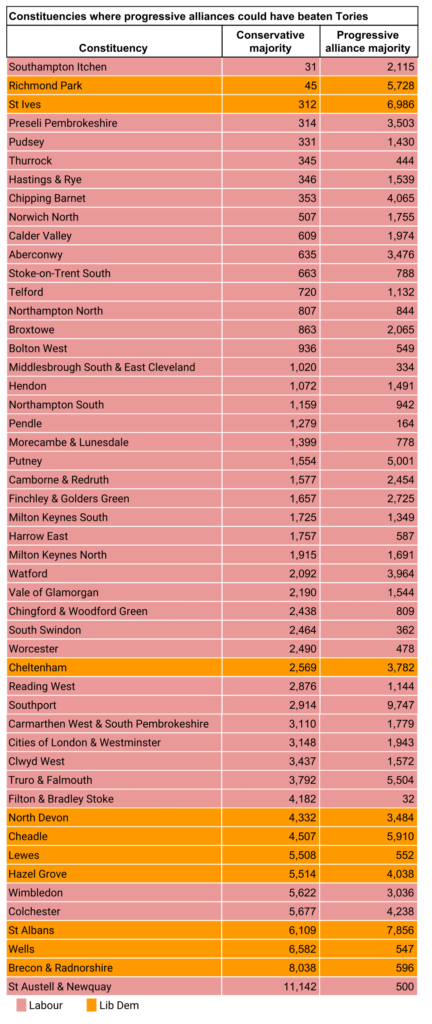During this election, many pro-Europeans saw tactical voting as a way to defeat hard-Brexit Tories and put the brakes on Theresa May’s promised landslide. The Greens in particular advocated what they call “progressive electoral alliances”, where parties that accept that label – Labour, the Lib Dems, Greens and others – would stand aside and endorse the most likely progressive challenger to the Tories in a given seat.
The idea never took off. Despite the Greens’ enthusiasm, the Lib Dems stepped aside in only two constituencies and crucially Labour didn’t participate at all. In several seats where smaller parties did stand aside, the desired result was achieved – although this often seemed due to other factors, such as the unexpected success of Jeremy Corbyn’s Labour party.
Elsewhere, there were plenty of seats won by Tories where an electoral alliance could have succeeded in stopping them. On InFacts’ calculations, if progressive deals had been made in every constituency (and assuming all votes for the participating parties had gone to the preferred progressive candidate), the Conservatives would have lost an extra 50 seats. The table shows where this would have happened, and which party would have taken the extra seats.

Some of these seats were already targets for progressive alliances, and Labour’s participation would have made all the difference. For example, the Greens stood down for the Lib Dems in St Ives and Richmond Park, both of which the Tories won with very slender majorities.
Even short of a full nationwide alliance, there were some obvious trades to be made, where Labour could have stood down in a Lib Dem target seat in return for the Lib Dems repaying the favour. Two examples are Hastings & Rye and Lewes, both in Sussex. If a deal had been agreed, the Lib Dems could have beaten pro-Brexit Tory Maria Caulfield in Lewes and Labour could have claimed the scalp of home secretary Amber Rudd in Hastings & Rye.
The snap election made coordinating alliances difficult. “There wasn’t time to build deep relationships at either the top of the parties or more importantly on the ground,” wrote Green leader Caroline Lucas and Labour’s Clive Lewis in a recent Guardian article. Voters, too, might have found the idea of backing a “preferred” former opponent difficult to get used to.
Even so, the size of the potential impact is impressive. Perhaps some of these post-election calculations will encourage more enthusiastic deal-brokering from progressive parties next time voters are asked to go to the ballot box.
Edited by Bill Emmott


Assuming everything went as happened in this article, it would have left Labour just 20 seats short of an effective majority (assuming speaker, deputy speakers, and Sinn Fein don’t vote.)
That would allow Labour to go into government with the SNP, in which case Lib Dems would still have no representation.
Any progressive alliance wouldn’t just need Labour to agree to stand aside in Lib Dem target seats, it would also need Labour to do at least one (and arguably all) of the following:
– Stop supporting brexit (or at the very least offer a referendum on the deal, with the option to remain.)
– Replace FPTP with proportional representation.
– Guarantee Lib Dems a role in government if Labour are the largest party, even if Labour were to win an outright majority.